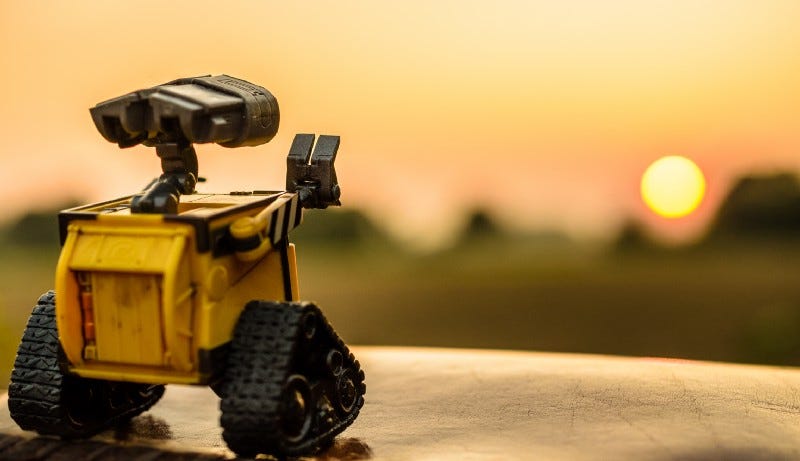Stay Loved amid Overwhelmingly Lonely Times
This February — the month of love — has never been more lonely for many of us under the pandemic. Personally, COVID-19 has popularized remote work in my job, making me stay apart from people most of the time. While I truly love the flexibility working a fully remote job offers, it turns out I can feel immensely lonely If my work day only involves telecommuting. It has never been clearer to me that there is a human need for emotional bonding, and I realized I need to seek it through other means as I would not want to burden a partner with my overwhelmingly lonely feelings.
Dedicated to the lonely, through this article I would like to share with you the findings from my research — what I figured out from my craving of companionship during these unusually lonely times. I will learn with you:
The importance of feeling loved amid challenging times — how being in a secure relationship prevents health issues and aids personal growth.
Why the feeling of loneliness kicks in even under a safe environment.
Ways that everyone, singles or couples, can use to cope with loneliness.
With references from numerous books and thinkers, let’s dig inwards together so that we can better cope with loneliness, and ultimately, be more capable of loving ourselves and others. ️❤️
Being deeply loved by someone gives you strength, while loving someone deeply gives you courage. — Lao Tzu
The Need for Emotional Bonding in This Inherently Traumatic World
Maslow’s hierarchy of needs suggests that, once we satisfy our needs for the basics — food, water, shelter and security — the most important thing for human beings is a sense of belonging and love; we have to gratify our need for love before we can gratify our need for self-actualization.

This is especially true during other major setbacks, not just COVID-19, as revealed by people who survived the September 11 attacks. According to the book Hold Me Tight, those survivors were much better off 18 months later if they felt emotionally in touch with someone close. Survivors who were in safe relationships even seemed better off than before the attacks, as if the challenge had facilitated self growth, whereas isolated survivors suffered from crippling flashbacks and depression.
True friendship is like sound health; the value of it is seldom known until it be lost. — Charles Caleb Colton
Indeed, it turns out that loneliness can cause illness and even death. The UK’s National Health Service estimates that lonely people are 30 percent more likely to die sooner. Loneliness, says the NHS, increases the risk of severe strokes, as well as conditions such as depression and dementia.
Therefore, we do need emotional connections to deal with this inherently traumatic world.
Human Beings Crave Social Connections by Evolutionary Nature

Looking back from our human history, feeling lonely is an evolutionary trait, as our need for company kept us safe from predators.
According to the book Loneliness, for our early human ancestors, being separated from a circle or tribe of familiar people was alarming. Being a part of such groups, i.e. safety in numbers, was typical in the ancient days, to ensure predators are kept away so that children can be safely raised.
As living alone was a deadly proposition for our ancestors, these feelings of loneliness are hardwired into our brains. As studied by the neuroscientist author, the shameful feeling we have towards loneliness is still part of our biological wiring today and can show up even under a safe living environment.

The Zen Buddhist book How to Love goes on to explain that a relationship where partners share common aspirations, dreams and connecting on a deep emotional level is the only cure for loneliness.
Having a Right Mix of Relationships Makes Us Less Lonely in a More Healthy Way
So, is having a close partner the solution? For some, yes, but to my surprise, only 17 percent of married couples are happy with their marriage. Therefore, don’t be fixated into thinking that we can only be happy with a lover by our side. Instead, try to take priority away from intimate relationships. Our happiness should not totally depend on a lover.
In fact, according to the book Together, to be happy, one has to have a good mix of inner and outer circles. The author tells us to think of our relationships in circular groupings. The closest thing to us is our inner circle. Less close are our outer circles, consisting of friends and casual acquaintances.

Although having a close inner circle is essential, it is not all. Sometimes loneliness can be paradoxically caused by our closest friendships. Specifically, when we prioritize those closest to us, that is, our romantic partners, we can neglect our broader friendships and our need for collective connections. Therefore, the author states that we need a balance of different relationships from these circles to lead a fulfilling life.
3 Tips to Cope with Loneliness with or without a Partner
As discussed, our inner circle or partner isn’t everything — having a meaningful and warm experience with a family member, a friend, or even a stranger is also love. All that it takes is initiating a connection with another human being, and there will be love.
The first tip is from It’s Not You which informs us of a way to fully experience such love —expanding your love circle with loving-kindness meditation. To perform it, think of somebody close that you love and wish them happiness by saying a caring mantra. For example:
May you be happy. May you be free from suffering.
Spend a little time repeating the mantra as you think about the person. After doing this, repeat it again with another person in mind, somebody you’re not that close to. This will enable you to expand your love circle and be grateful to the people meaningful to you. This will also make you a more compassionate and calmer human being.

The second tip from this book is treat yourself as you would a dear friend. Being compassionate with yourself or self-compassion is a tremendously valuable trait. By treating yourself with compassion, you will greatly improve the relationship with yourself and therefore with others, including a potential lover.
How can you be kind with yourself? The next time you feel left out, lonely or sad, just imagine your best friend feels the same way you do and take comfort as you would with this friend.
While it may seem strange to consider a “relationship” with yourself, it is the most important relationship you will ever have. Learning to love and value yourself is essential to happiness and is also the first step in maintaining relationships with others.
The third tip is from The Art of Living Alone and Loving It — build a “self-esteem scrapbook” by filling it with things that make you smile, such as messages from friends. At the beginning of the author’s scrapbook is a list she made of her best qualities, followed by things like letters of appreciation and support messages she received after her divorce. A scrapbook like this can be greatly comforting when negative feelings start to creep in.
Never underestimate the time we spend alone with ourselves. Only after we are capable of treating ourselves with self-compassion can we foster our love with our partner, improve relationships with others, which in turns strengthens ourselves to better cope with challenges including loneliness.
In summary, we discussed the health impact of being lonely during tough times, why it is normal for us human beings to feel lonely by our evolutionary nature so that we fulfill our natural need to connect, why it is better to love through a mix of social circles instead of just one circle, as well as 3 tips to cope with loneliness with or without a partner:
Expand your love circle with loving-kindness meditation so that you are more aware of the love that surrounds you.
Be kind to yourself as you would a dear friend.
Build a self-esteem scrapbook of comforting memories.
That being said, don’t forget to reach out to people as you’ve just learned the importance of that. One bonus tip from my recent experience is joining a close community with your characteristics where you can talk to like-minded people and feel safe opening up about yourself. For myself, I’ve tried event-hosting websites where I’ve joined several speaking groups which I’m interested in, as well as getting to know a very good new friend of mine who connects with me on an emotional level, sharing similar values as I do… :)
With that, I wish both you and I are well-equipped with the ability to love despite the current social distancing circumstances, turning merely being lonely into joyfully alone.
Life’s greatest happiness is to be convinced we are loved. — Victor Hugo
What’s next? Check out the book references I have linked above to expand on areas you would like to learn more about.
Stay loved.❤️


